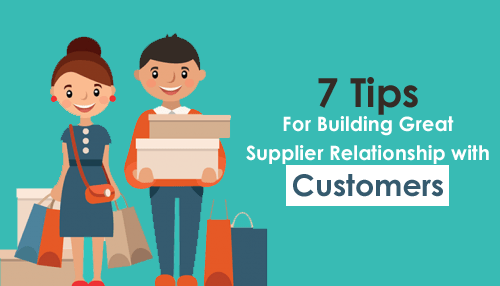Although there are certainly many forms of eCommerce and many business models, one of the most common types of online retailing involves merchants purchasing products from wholesalers and selling those products at a reasonable premium to consumers. A good relationship with customers may lead to favorable prices, generous terms, improved availability, and even the occasional buyback. With these sorts of opportunities at stake, it can be very important for online retailers to nurture supplier relationship with key manufacturers and distributors.
In this business model, the retailer is dependent on the supplier—a manufacturer or distributor—for setting prices, payment terms, shipment dates, and even determining if a product is available at all.
It would be a mistake to think that a small or midsized retailer may simply place orders with any supplier. With so much at stake, Internet and multi-channel retailers would be wise to invest time and effort into having great supplier relationships.
No. 1: Pay on Time
The first tip for building great supplier relationship is an obvious one. Pay on time and as expected.
Wholesale distributors and many product manufacturers work on thin margins so cash flow is important to their business. A retailer, even a small one, that pays on time as promised every time becomes a trusted and respected customer. Some wholesalers track payment history right through their customer relationship management software and even rate retailers based on how well they pay.
Merchants with a good payment history may earn better prices or, eventually, get better terms, meaning that they will have longer to pay.
No. 2: Set Clear and Achievable Goals
Some wholesalers will want to have estimates of how many products a retailer expects to sell in a given period so that those wholesalers may in turn provide feedback to manufacturers or, in the case of distributors, better understand how many items they should order themselves.
Providing clear sales estimates and goals will help the wholesaler plan.
No. 3: Know that They Have Other Customers
Small and mid-sized retailers have a lot of competitors, and wholesalers may be serving both your business and your closest competition.
To improve the supplier relationship, be patient. Understand that from time to time your representative will be busy. And don’t act as if you own the supplier. You don’t.
No. 4: Learn What They Need From You
Since suppliers do have many customers and a number of relationships to maintain, it can be helpful to learn what they need from you.
Some suppliers will need specific documentation. A toy supplier, as an example, in the southeast would like to have a spreadsheet filled out just so, emailed or faxed with every order. A larger manufacturer selling directly may require a retailer to place orders via the electronic data interchange (EDI) standard.
Ensuring that suppliers have the proper documents, delivered in a preferred channel, can speed up order processing — i.e., a merchant’s order might be shipped sooner.
No. 5: Don’t Blame Them
There are going to be problems. Every supplier will make mistakes or be the victim of circumstance. Blaming the representative on the other end of the telephone or complaining via email will not help the situation.
Instead, work with the supplier to find a solution.
A buyer at a retail chain in the northwest learned that a supplier was not going to be able to ship part of an order. There had been a manufacturing problem, and there simply was not enough of the product to go around. The buyer worked with the supplier to make the best of the situation.
Later that same buyer made a mistake, ordering too much of a particular product. The supplier’s representative, perhaps remembering how he’d been treated when there was a problem in the past, quickly agreed to buy back the extra merchandise.
No. 6: Make Friends
There are two good reasons to try to make friends with representatives from wholesale suppliers.
The first of these has to do with human nature. We would rather work with people we like. When you take the time to make friends with the folks at a supplier, placing an order over the phone is not just a business call, it is a chance to enjoy some good conversation.
There is also a very pragmatic reason for making friends with suppliers. People are usually willing to do more for a friend than someone they just know by a corporate account number. Having friends at a supplier can provide access to products with low availability or even earn better prices.
No. 7: Train Them to Know What You Need
Once you have a reputation for paying on time, providing orders in the proper format, and being friendly with the supplier’s representatives, you can start to train the supplier to give you what you need.
Ask if it is possible, as an example, to get notified when new product images are available. Or ask if it is possible to order some products in smaller or larger quantities. Many wholesalers will note your needs and help to fulfill them.
Article Written by Armando Roggio | practical ecommerce



